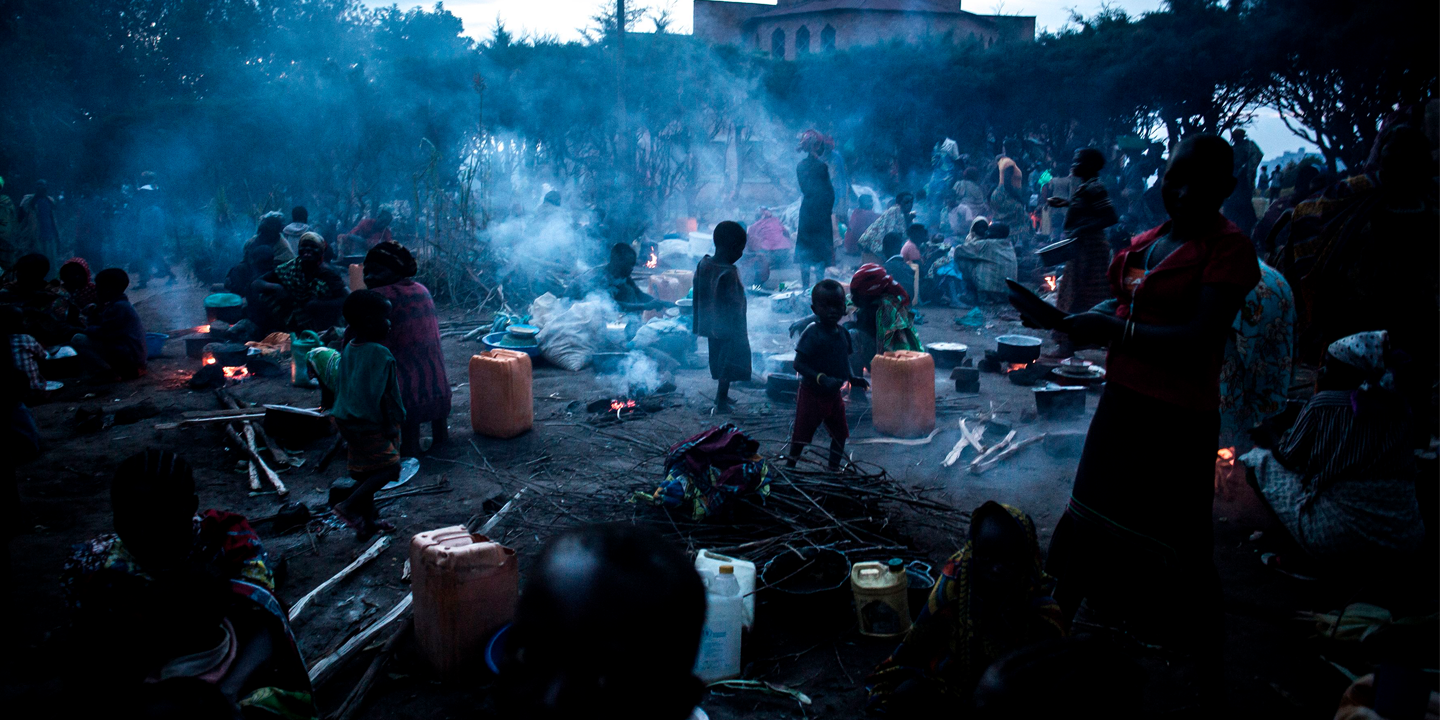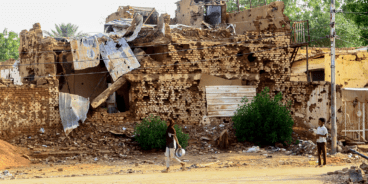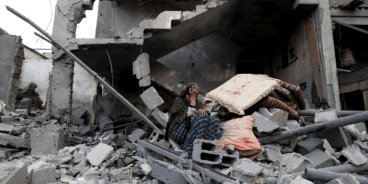

Atrocity Alert No. 203: Afghanistan, Democratic Republic of the Congo and Sudan
Atrocity Alert is a weekly publication by the Global Centre for the Responsibility to Protect highlighting situations where populations are at risk of, or are enduring, mass atrocity crimes.
Deadly attack on maternity hospital and funeral in Afghanistan
Yesterday, 12 May, at least 24 civilians, including newborn babies and their mothers, were killed in an attack on a maternity hospital in Dasht-e Barchi, a Shiite area of western Kabul. Attackers wearing police uniforms stormed the hospital and started throwing grenades and shooting. The Dasht-e Barchi neighborhood is home to members of the country’s Hazara minority, a Shia community that has been persecuted and attacked by various armed extremist groups operating in Afghanistan. That same day, in the eastern province of Nangarhar, a suicide bombing during a funeral killed at least 32 civilians.
Both atrocities amount to war crimes. The UN Assistance Mission in Afghanistan (UNAMA) responded by expressing their “shock and revulsion at today’s terrorist attacks at a Kabul maternity hospital and a funeral in Nangarhar, causing significant civilian casualties.” UNAMA also called “for those responsible to face justice and offers condolences to victims and families.”
UNAMA has reported a drastic increase in civilian casualties since the signing of the United States-Taliban peace agreement in February. Both the Taliban and Afghan security forces have been responsible for civilian deaths, while the armed extremist group, the Islamic State of Iraq and the Levant-Khorasan (ISIL-K), has also increased its operations, conducting four roadside bombings this week. It is feared that these attacks may have been in revenge for the recent capture of a number of high-ranking ISIL-K members.
No group has claimed responsibility for the hospital attack, although the Taliban have denied responsibility. ISIL-K has admitted responsibility for the funeral attack in Nangarhar. Jahaan Pittalwala, Research Analyst at the Global Centre for the Responsibility to Protect, said that “there is no ideological, religious or moral justification for these atrocities. The threat of further war crimes and potential crimes against humanity will continue unless a comprehensive ceasefire is implemented throughout Afghanistan and upheld by all parties to the conflict.”
Despite peace talks, more than 10,000 civilians were killed or injured in Afghanistan during 2019. The government should strengthen protocols to prevent civilian casualties and increase efforts to ensure the security of vulnerable ethnic and religious minorities. The international community should continue to pursue international justice for all war crimes committed in Afghanistan, regardless of the position, nationality or affiliation of the alleged perpetrator.
200,000 people displaced as army and militias clash in DR Congo
Recent fighting and deadly reprisal attacks between the Democratic Republic of the Congo’s (DRC) armed forces (FARDC) and armed groups in Ituri province leaves civilians in Djugu and Mahagi territories facing the threat of further atrocity crimes. The Spokesperson for the UN High Commissioner for Human Rights, Rupert Colville, stated that, “the brutality of the attacks, with perpetrators using machetes to kill women and children, raping, looting property, destroying houses and killing livestock, suggests the aim is to inflict lasting trauma on the affected populations, forcing them to flee.” At least 200,000 people have fled their homes in the past two months, contributing to the more than 1.2 million people displaced in Ituri.
The violence has primarily involved the Cooperative for the Development of Congo (CODECO) armed group, whose members are predominantly from the Lendu ethnic community. Although the government launched an offensive against the group last December, fighting escalated after the CODECO leader, Ndudjolo Duduko Justin, was killed during March, leading to reprisal attacks as well as in-fighting for control of the group. According to the UN Refugee Agency (UNHCR), local populations in Ituri have been subjected to an average of 50 attacks per day since early March, resulting in the killing of 274 civilians, the rape of at least 140 women, as well as the destruction of thousands of homes.
During January the UN Joint Human Rights Office (UNJHRO) in the DRC accused CODECO of potential crimes against humanity relating to fighting between the ethnic Lendu and Hema communities. The Hema and Lendu have a longstanding history of disputes over access to land and resources, including fighting in Ituri province that started in the late 1990s and resulted in thousands of deaths. According to UNJHRO, at least 700 people were killed during several waves of inter-communal violence between December 2017 and September 2019. The majority of victims were from the ethnic Hema community.
The recurrence of deadly conflict in Ituri demonstrates the urgent need for inter-communal reconciliation efforts as well as the need to break the cycle of impunity for past atrocities. The government should ensure the protection of civilians remains a primary priority as the FARDC undertakes its offensive against CODECO and all other non-state armed groups.
Deadly inter-communal clashes threaten Sudan’s democratic transition.
Recent inter-communal fighting in parts of Darfur and Kassala State threatens Sudan’s fragile democratic transition. On 5 May clashes between cattle herders from the ethnic Fallata and Rizeigat communities in South Darfur led to at least 30 people being killed. Violence broke out following a violent dispute in Tullus and quickly spread to surrounding areas. Between 7-10 May clashes also erupted between the Nuba and Beni Amer communities in Kassala city, Kassala State, resulting in at least eight people being killed. Hundreds of people fled the violence while numerous houses were torched.
The government dispatched the army and the Rapid Support Forces (RSF) to South Darfur and Kassala to contain the violence. In a national address, Lieutenant General Abdel Fattah Al-Burhan, head of the joint civilian-military Sovereign Council that is responsible for Sudan’s transition to democracy, said that the security forces would act decisively “to secure the country, lives and property.”
Inter-communal violence has been intensifying since January when a series of clashes between Arab and Massalit communities around El Geneina, West Darfur, resulted in at least 70 people being killed and 40,000 displaced. During January the UN Panel of Experts on Sudan expressed grave concern about local RSF fighters supporting some perpetrators of inter-communal violence. Some sources also claimed that an RSF commander was responsible for some attacks on civilians in West Darfur.
The RSF were used by Sudan’s previous military government to wage war against armed rebel groups, including Massalit groups in Darfur. The RSF also includes former Janjaweed who have been accused of committing war crimes, crimes against humanity and genocide during the bitter armed conflict in Darfur that started in 2003. Following the overthrow of former military dictator, President Omar al-Bashir, the RSF were also implicated in a violent crackdown against protesters in Khartoum during June 2019 where at least 120 people were killed. There have been widespread calls from Sudanese civil society for RSF officers who are responsible for human rights violations and abuses to be held legally accountable for their actions.
Despite ongoing conflict in Darfur, the UN Security Council is discussing an exit strategy for the African Union-United Nations Hybrid Operation in Darfur (UNAMID). The drawdown of UNAMID is part of a planned transition from peacekeeping to peacebuilding in Sudan. As part of that transition, the Sovereign Council should transform the RSF into a professional and accountable force, in accordance with the Rapid Support Forces Act. The UN Security Council should continue to support Sudan’s democratic transition and assist the Sovereign Council as it attempts to protect civilians, uphold human rights and resolve ongoing inter-communal conflicts.
Related Publications


Atrocity Alert No. 432: Sudan, Venezuela and Haiti
